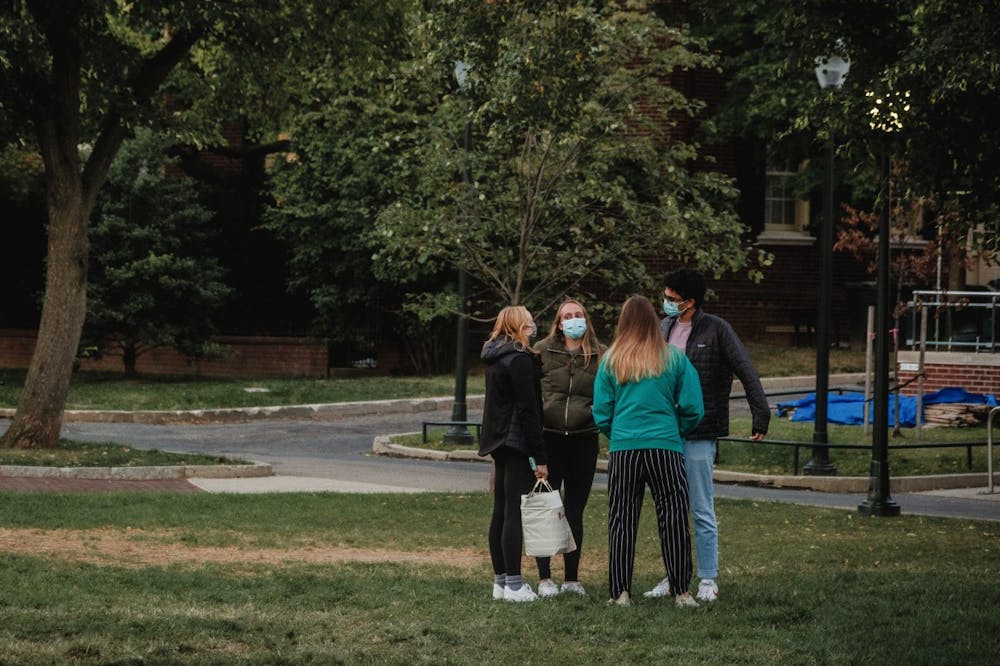
This past Sunday, the Perelman School of Medicine's Office of the Executive Vice Dean and Chief Scientific Officer sent an email to faculty members advising them to pause undergraduate laboratory research. This email came just a few days after a University-wide notification warning about increases in COVID-19 case counts, and the corresponding possibility that a campus-wide quarantine may be imposed.
Both of these communications send a clear message: because of the actions of some, all may be punished. Over the past week, the undergraduate positivity rate reached 4.47%, and isolation capacity fell below 60%. If these numbers continue to increase, it is entirely possible that Penn will order a campus-wide quarantine, or worse yet, sends students home. Although not all of the blame for increased case counts can be pinned on any one source, it is likely that a chunk comes from student events held in direct violation of the Campus Compact. Therefore, in order to save the current hybrid semester, Penn undergraduates must change the culture surrounding COVID-19, creating one that takes the disease more seriously.
There is no one attitude towards COVID-19 on campus. However, anecdotal evidence suggests that Penn has a unique problem with containing the disease, given its relatively high case rate compared to other Ivy League Schools. The logical conclusion of this is that Penn students are likely engaging in more risky behavior than their peers, an attitude that needs immediate correction. Through engaging in positive peer pressure, finding virtual ways to socialize, minimizing off-campus travel, and directly holding peers accountable, concerned Penn students can create a more COVID-19-conscious culture.
Peer pressure is typically associated with risky activities, such as consuming alcohol or drugs — and in this case, breaking the Campus Compact. However, Penn students have a chance to use it as a force for good. Primarily, they can promote a positive COVID-19 culture by having tough conversations with their peers. Although such an idea may seem trite, it is likely that students, especially first years, breaking the compact are doing so out of social pressure, and putting pressure in the opposite direction may reverse this problematic trend.
Furthermore, Penn students have to find more COVID-19-conscious ways to socialize. Currently, many violations of the campus compact occur in the form of parties, events where students are typically indoors, not socially distanced, and gathered in large crowds. While there might be social pressure to attend these types of events, undergraduates should recognize that there are other, more COVID-19-conscious, ways to socialize. Instead of throwing parties, students can hold Zoom happy hours, dine outdoors, or gather safely indoors with their pods.
Penn students must also limit travel off-campus, particularly in the rest of Philadelphia. There is substantial research suggesting that infections in the communities surrounding colleges increase as a result of reopenings, putting lives in danger. Many citizens of West Philadelphia have already expressed concern about this exact scenario playing out, and in the last two weeks, the 19104 zip code has the highest infection rate per 10,000 residents in the city. To prevent further damage, Penn students must limit travel to areas outside of University City when possible by reducing trips to off-campus restaurants, gyms, and indoor locations.
As a last resort, students could try holding their peers accountable through the school itself, namely by reporting violations of the compact. Many would understandably hesitate to report a fellow student, particularly one they have a personal relationship with. However, it may be the only option if other measures do not work.
The semester’s survival is at stake, and Penn students must do everything in their power to save it. The only way to keep the hybrid experience alive, and preserve some sense of normalcy, is for students to directly change the culture surrounding COVID-19 at Penn.
Editorials represent the majority view of members of The Daily Pennsylvanian, Inc. Editorial Board, which meets regularly to discuss issues relevant to Penn's campus. Participants in these meetings are not involved in the reporting of articles on related topics.
The Daily Pennsylvanian is an independent, student-run newspaper. Please consider making a donation to support the coverage that shapes the University. Your generosity ensures a future of strong journalism at Penn.
Donate






